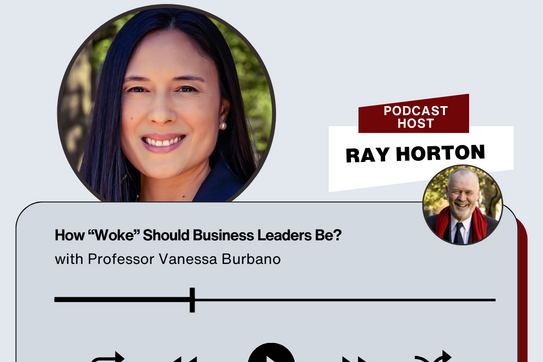In this session of More MPE, we focus on an issue that bedevils many business leaders: Should they speak out on socio-political issues? Host Professor Ray Horton speaks with Vanessa Burbano, the Sidney Taurel Associate Professor of Business at Columbia Business School. Her award-winning research addresses the question.
We began by talking about how she became interested in the question. Before entering academia, Burbano worked for several years in the private sector in positions that led her to wonder about the relationship between corporate social responsibility (CSR) and corporate profitability. Her early research on the response of employees to various CSR initiatives showed that employees were motivated by the policies to perform better on their jobs. Profitability increased because, for example, employees performed better and turned over less.
She began to think about the “speaking out” issue when Chick-fil-A’s CEO took a public stance against gay marriage, a very “unwoke” thing to do that prompted a debate in business and academia over whether speaking out on “political” issues was a good strategy. Burbano’s instinct, drawing on her earlier research, was that it depended on how a firm’s employees felt about the position. It could have a motivating effect if they agreed and a demotivating affect if they didn’t. But her research yielded an asymmetric finding. Employees who agreed with the position were not motivated to perform better, while employees who disagreed performed worse. Ergo, Burbano’s research suggests that it’s better to stay silent at least from the perspective of profitability.
But she recognizes there may be exceptions to this general rule, which is causing her to think about another wave of research. Some firms are not devoted to profit maximization; they value social goods too. Patagonia comes to mind for its explicit commitment to protecting the environment, which is said to reflect the values of its workforce. If Patagonia’s CEO stood silent on an environmental issue, wouldn’t its employees be demotivated?
We end the session speculating about another phenomenon, the evidence that interstate migration of Americans is increasingly dictated by the red state-blue state litmus. Conservatives vacate blue states in favor of red states; vice-versa for liberals. If political conflict continues to grow in the United States, could the day come when workers choose their employers on the basis of their stances on political issues?
Mentioned in this episode:
- Vanessa Burbano, (Columbia Business School)
